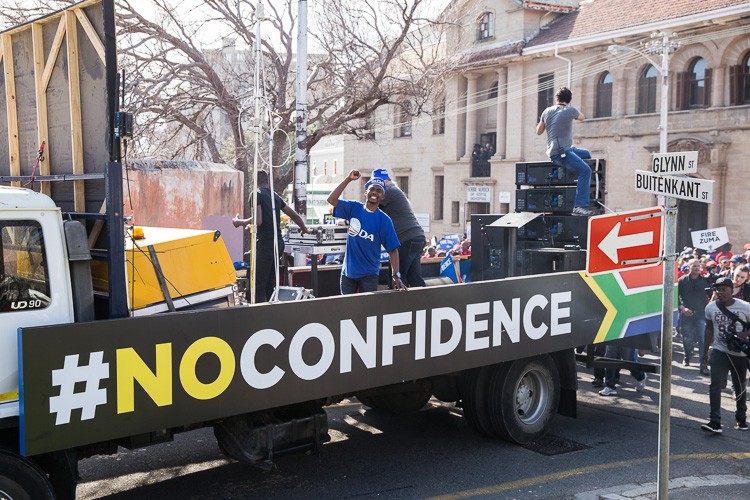
There were protests in Cape Town, Pretoria and Port Elizabeth against President Jacob Zuma on Tuesday. Photo: Ashraf Hendricks
8 August 2017
There were cheers from both sides when Speaker Baleka Mbete announced the results of the vote on the motion of no confidence in President Jacob Zuma.
The motion against Zuma was defeated, again, but only by 21 votes. For the opposition it was a first. Never before had its regular motions of no confidence come so close to winning. It was generally conceded, by all except the ANC, that Zuma’s victory was so close that he should be a worried man.
Nevertheless, ANC Chief Whip Jackson Mthembu looked relieved at the end of it all and Zuma did what he usually does. He took to the podium to sing and dance in celebration at what was effectively a very close shave.
The motion sought to have president Zuma removed from office on the basis of Section 102 (2) of the Constitution. The DA referred to the removal of former Finance Minister Pravin Gordhan and his deputy Mcebisi Jonas and accused Zuma of “irresponsible, reckless and irrational leadership”.
This was the eighth unsuccessful motion of no confidence to be brought against the President by the opposition Democratic Alliance since he came to power in 2009.
But this time there was one important difference. After a Constitutional Court hearing, the Speaker of the National Assembly, Baleka Mbete, was left to decide whether calls by opposition parties for a secret ballot would be permitted. Their concern was that ANC members would be penalised if they voted with the opposition in an open vote and needed the protection of a secret ballot if they wanted to bring their party leader down.
Mbete took a while to reach a decision, but at the last minute, less than 24 hours before the vote, agreed that Members had the right to honour their pledge to the Constitution above their loyalty to their own parties.
This was a significant about-turn, and it seemed to have resulted in an unprecedented increase in ANC votes in support of the motion, suggesting that more members of the ruling party than was expected had voted according to their conscience instead of their party position.
For the first time, private voting booths were erected in the Chamber to allow Members to vote privately. The ballot boxes were then sealed and counting was conducted under strict supervision.
After a two-hour voting process and with a total of 384 votes cast, Mbete announced 198 MPs had voted against the Democratic Alliance’s bid to remove Zuma, while 177 voted in favour, meaning the motion was defeated by 21 votes. There were nine abstentions.
ANC MPs held a caucus meeting during the morning in which they were told the party line was to protect Zuma. They emerged from the meeting appearing confident and buoyant.
But the opposition speakers lashed out at Zuma during the debate and made impassioned appeals to ANC members to vote with them to remove Zuma from office.
Zuma’s relationship with the Guptas was one of the chief criticisms of Zuma, with Reverend Kenneth Meshoe from the African Christian Democratic Party saying “the extent of allegations of state capture is treasonous.”
The Economic Freedom Fighters’ Julius Malema stated “we are here to remove Duduzane, in a reference to Duduzane Zuma, the president’s son, who according to the #GuptaLeaks has played a significant role in the controversial allegations of corruption involving Zuma and the Guptas.
As leaders of each of Parliament’s opposition parties took to the podium many declared their support for the motion.
Pieter Groenewald from the Freedom Front Plus called the President a blame shifter; asking when South Africa could have trust in the president. The African People’s Convention’s Themba Godi, who is also the Chairperson of Parliament Standing Committee on Public Accounts, said his party would support the motion as it wanted ethical leadership in the country.
Bantu Holomisa from the United Democratic Movement summed up the mood in one statement. “We have to seize the opportunity to put our country first.”
For the ANC Arts and Culture Minister Nathi Mthethwa said the allegation that the recall of Gordhan and Jonas led to a downgrade and recession was fake news. He chose instead to focus on the successes of the ANC in developing access to electricity, social grants and education.
While the votes were being counted, ANC members and their supporters in the public gallery danced and sang their praises to the ruling party.
They came out of the debate victorious and joined crowds of ANC supporters gathered in the parliamentary precinct and the surrounding streets.
In Cape Town and cities elsewhere in the country there were protests during the day, both for and against Zuma as citizens demanded to have their voices heard.